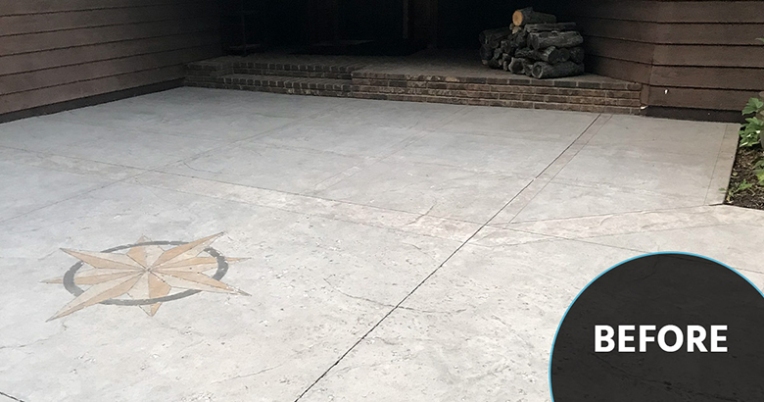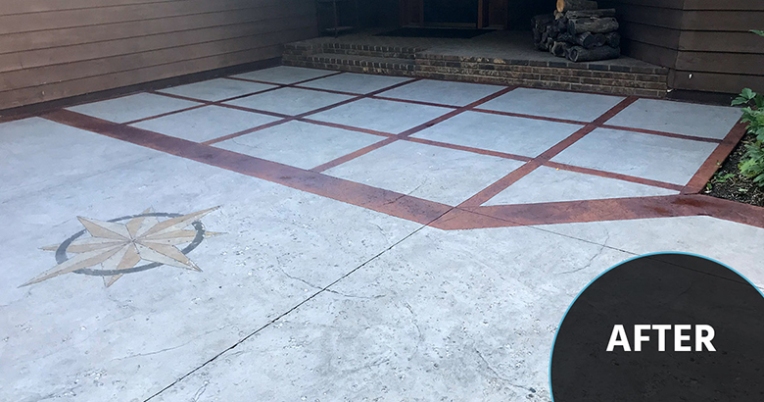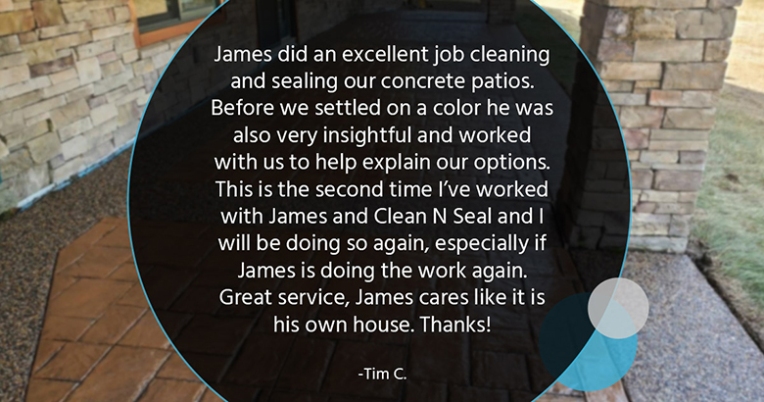7 Things Everyone Should Know About Concrete Cleaning

Whether you’re in the mood to do some spring cleaning or you just noticed an oil stain on your driveway, making time to clean your concrete this spring or summer is a beneficial way to spruce up your property. Especially when done professionally, it’s a fast way to instantly add curb appeal to your home, boost the longevity of your concrete, and allow you to enjoy your outdoor spaces safely.
While there are a variety of ways to clean concrete, from DIY scrubbing to professional power washing, our years of experience have taught us some dos and don’ts when restoring it.
Here are some recommendations and suggestions on what to know and do to get the best results from your concrete cleaning process.
1. Why Should You Clean Your Concrete?
There are plenty of good reasons to clean your concrete and to maintain it every few years. Whether the appearance of a fresh, smooth driveway is important to you or you want to invest in safety on your property, concrete surfaces that are free from stains, cracks, and growing things are vital.
The best way to have these eyesores and potential hazards taken care of is to rely on regular concrete cleaning, especially from a caring and experienced restoration company.
2. When Should You Clean Concrete?
There’s no one answer to this question, but the rule of thumb is essentially clean concrete when it needs it or every couple of years. When you notice your concrete is changing colors, looking dingy and dirty, is accumulating stains, or has mold or mildew growing on it, then it’s definitely time for some restoration.
March through November is considered power washing season; though, in Minnesota that can vary depending on the weather.
The best time of year to wash, scrub, and hose down your concrete driveways and sidewalks is when the weather is consistently above 40°F.
3. Do Different Styles of Concrete Require Different Cleaning Methods?
In short, yes. If you’re trying to DIY cleaning your concrete, do some research on how to clean the specific type of concrete you have.
Here are some quick tips for cleaning different concrete surfaces:
- Unsealed or untreated concrete is susceptible to staining, but it can handle harsh chemical cleaners, like trisodium phosphate (though it’s not environmentally friendly). After spraying concrete with a hose, use a stiff-bristled brush to scrub the chemical solution onto the surface. Then rinse.
- Concrete that is sealed is more resistant to stains, but harsh chemical cleaners will damage the sealant. Stick to cleaning only with dishwashing detergent.
- Stained concrete should be cleaned with a pH-neutral cleaner and water to help maintain the stain color.
- Be observant and careful when washing stamped, textured, or imprinted concrete. Clean with a gentle dishwashing liquid and use a brush or broom to get into the crevices, and then make sure to rinse off all the residue from between the cracks.
When in doubt or when you recognize how much work goes into DIY concrete cleaning, call a professional team, like Clean ‘N Seal, to properly restore any type of concrete surface you have.
4. Can Pressure Washing Damage Concrete?
Yes. For those who don’t want to use chemicals when cleaning concrete, pressure washing can be a good alternative. However, if you don’t have the right pressure washer or you don’t know how to use it correctly for concrete, you can end up etching into your driveway or damaging your patios.
The safest course when pressure washing is to hire a pro who knows the proper techniques when restoring concrete and has the right equipment for the job.


5. Are Stains on Concrete Hard to Remove?
They can be. Depending on the type of stain, how ground in it is, and how old the stain is can all affect how quickly and easily you can remove it. Whether you have grease and oil stains to rust or mildew growth, DIY stain removal is hard work.
Renting the best equipment for stain removal is costly, plus you should have some knowledge and proficiency at using it before you try to tackle your stains. Otherwise, you’re more likely to harm your concrete than restore it.
Removing stains without pressure washing equipment can be back breaking work, requiring a lot of scrubbing and sometimes the use of harsh or even toxic chemicals. Avoid injuring yourself or harming the environment by working with an expert when removing stains.
6. Should You Seal Your Concrete?
Definitely! Similar to sealing pavers, this is a beneficial step that when done professionally will keep your concrete looking good longer. Sealing your concrete after cleaning it protects it from stains, UV light, cracking, and growing things, and it makes it easier to clean your concrete in the future.
Have a pro come out every 3-5 years to do a full clean and reseal of your driveways and patios, and they’ll last as long as you own your home.
7. Should You DIY or Hire a Pro?
DIY may seem like a cost-saving way to clean concrete, but after buying the chemicals, renting the equipment, and spending your entire weekend busting your knuckles scrubbing, you’ll realize that hiring a professional is a better use of your money and time.
Not only do pros make it easier for you to keep your surfaces clean, it’s often cheaper in the long run because it keeps your property cleaner for longer, especially if you seal your concrete.
State of the art equipment and years of training and experience also ensures that your surfaces won’t be damaged during the cleaning process, either.

Get a Professional Clean With Clean ‘N Seal!
Make Clean ‘N Seal your go to for all your concrete restoration projects! More than 10 years of experience cleaning and improving residential and commercial properties all across the Twin Cities has earned us a trusted reputation for all our cleaning services.
Schedule a consultation and get a free estimate for concrete cleaning today!